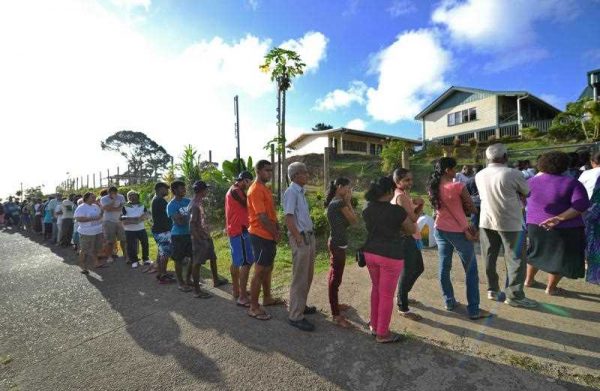This generation has not lived in a period of genuine democracy, free from militarism, chiefly patronage, and racially-based and biased politics. According to preliminary figures, 47 per cent of the voting population were within the ages of 18–35. Out this group, 75 per cent voted for the first time.
The majority of these first-time voters were young people whose political conscience had been formed during an intense period of military rule from 2006–2014. For over half a decade, these young minds have been exposed to only one set of political views: those of the military. This suppression was assisted by stringent enforcement of media censorship, which effectively strangled investigative and critical journalism in the country. The mangling of free thought in Fiji has resulted in a mediocre and passive media.
Expanding political resistance to the military began within blog sites, before moving to social media. In this new online space, dissenting voices, otherwise suppressed in a restricted media environment, were able to re-emerge.
Other reasons for the rise of social media in Fiji include the ability to communicate instantaneously and directly, especially with a growing youth population, increasing internet accessibility with expanding information and communications technology devices, and more competitive costs. Most political parties extended their campaigns onto social media, concentrating more of their efforts on Facebook.
Facebook has become Fiji’s most used social network, with 260,000 accounts as of January 2014. 70 per cent of Fijian Facebook users are aged 18–35. Young people are engaging actively on Facebook and are the key drivers in the expanding digital space of social media. Since opposing views tend to be expressed on social media, harnessing the youth vote online could potentially have resisted the military-led and -backed establishment.
But, as the election result showed, this was not the case. The military-backed and -led political party, Fijifirst, won 60 per cent of the vote in the 2014 national elections. Youth participation on social media wasn’t enough to resist the established military powers. Why was this?
Facebook penetration is still only 24 per cent of the total estimated population of Fiji, which means that a substantial number of young people still have yet to access Facebook. Those that do access Facebook, do not always actively engage in critical discussion online.
Despite social media’s expanding clout, traditional media still dominates in terms of penetration and audience size. Since traditional media is compelled to favour the ruling military, the government’s narrative therefore overwhelms any alternative social media narrative. As a result, critical youth engagement, which encompasses constructive criticism is still subject to the confines of traditional media and ultimately to the agenda of those who control and constrain it.
Fijifirst also appeared to be the most cognisant of the campaign advantages provided by social media. Fijifirst already had a head-start due to their domination of traditional media. The party then enlisted the services of a local communications company to administer the party’s social media campaign. They tailored and choreographed the political party’s image, successfully attracting an extensive online audience. The party’s social media savvy can be seen through their use of specific techniques, such as multiple pages, publicly staged images, and concise statuses and captions. As a result, the Fijifirst party recorded almost 63 per cent of the total Facebook audience.
It is highly likely that a substantial amount of Fijifirst’s engaged audience were young people. Through both traditional and social media channels, young people were effectively swayed to support the establishment.
Social media engagement in Fiji is rising dramatically even beyond the elections, as more and more young people now engage in Facebook group discussions. With more internet service providers in the country, internet access is expanding rapidly. This is coupled with a surge in hand-held devices with social media capabilities. With a new parliament in place, social media activity is increasing, particularly within opposition groups. The participation and engagement of young people with Fiji’s new parliament through social media has just begun.
Jope Tarai is a graduate student and researcher at the University of the South Pacific, Fiji.


Interesting piece Jope. Though I seriously think that those young people who have an alternative opinion to the ‘new kind’ of democracy which is evolving in front of our eyes make up a mere minority now. Maybe because the strategy used by the ‘pro positive’ change and freedom and human rights is not working and needs to be more innovative. The strategies for change 2-3 decades ago does not seem to be relevant any more I think. What do you think?